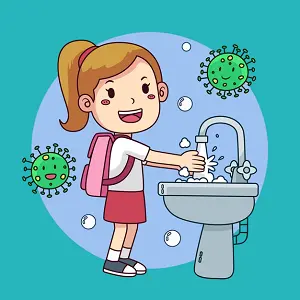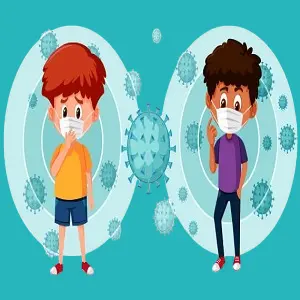Preventing infection in schools is essential to protecting children's health and ensuring safe education. Overcrowding increases the risk of disease transmission, and cooperation between families, school administration, and students remains the foundation for protection for all.
Avoid sharing personal items among students
Preventing the sharing of utensils protects against the spread of germs at school and protects children from infections, including:Do not share water bottles or eating utensils:
- Do not use other students' writing utensils.
- Store personal items in your child's backpack.
Coughing and Sneezing Etiquette
Following proper coughing and sneezing etiquette reduces the spread of infection in school, including:
- Use a tissue to cover your mouth and nose.
- If a tissue isn't available, sneeze or cough into your elbow.
- Dispose of the tissue immediately and wash your hands afterward.
The Importance of Regular Handwashing for Children

Hand washing is an essential habit to protect and prevent children from infections, including:Washing hands before and after eating:
- Washing hands after using the bathroom.
- Cleaning hands after playing or touching shared surfaces.
The Importance of Proper Nutrition and Immune Support
Healthy nutrition helps protect children from infections at school and strengthen their immunity, including:Eating a healthy breakfast before going to school:
- Including fresh fruits and vegetables in meals.
- Drinking sufficient amounts of water daily.
The School's Role in Maintaining a Healthy Environment for Children
School administration has an important role in limiting the spread and protecting children from infection, including:Regularly ventilating classrooms:
- Cleaning desks and floors daily.
- Providing hand sanitizers in classrooms and gathering places.
The Family's Responsibility in Infection Prevention
The family is an essential partner in protecting and preventing children from infection at school, including:Teaching children personal hygiene from an early age:
- Not sending children to school if they show symptoms of illness.
- Continuous communication with the school regarding the child's health status.
The Importance of Vaccinations to Prevent Infectious Diseases
Vaccinations are a strong defense against infections prevalent in schools, including:
- Adherence to basic vaccination schedules.
- Attention to seasonal influenza vaccination.
- Seeing a doctor if any dose is delayed.
Promoting health awareness among students

Continuous awareness helps students understand the importance of infection prevention at school, including:
- Holding health education seminars and activities.
- Placing awareness posters in classrooms and hallways.
- Encouraging students to adhere to healthy habits.
The Child's Role in Protecting Themselves and Their Classmates
The child is the primary element in implementing prevention within the school, including:
- Commitment to regular handwashing.
- Adherence to proper sneezing and coughing etiquette.
- Respecting hygiene rules and preventing the spread of infection among classmates.
Summary of Effective Ways to Protect Your Child from Infection at School
Protecting children from infection at school is a shared responsibility between the child, their family, and the school administration. Adhering to hand washing, proper sneezing etiquette, and not sharing utensils reduces the spread of disease.
The school's role is to provide a clean, healthy environment, while the family must support the child with nutrition and vaccinations. Cooperation is the foundation of a safe educational environment.